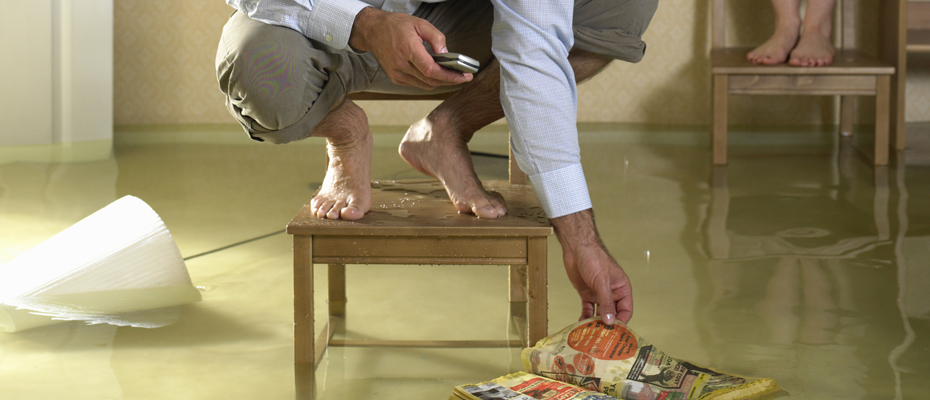Your home is an important investment, protecting it means taking preventative measures to avoid damage before it occurs. Water damage to your home not only results in costly repairs but could also be detrimental to your health. What if a pipe were to burst in your home during the heating season or water were to back up in your sewer during a heavy torrential downpour? Not only would you have to deal with a messy clean up, but you also run the risk of having your home infested with mould and suffering from respiratory problems due to dampness. In addition, water damage to your home can affect its structure and foundation.

According to the Insurance Bureau of Canada, insurance claims for Canadians who have suffered water damage due to inclement weather are on the rise and has accounted for the highest percentage of insured losses over the past few years. According to Goffin (2017), approximately 70% of Canadians live in metropolitan areas with populations of 100,000 or more. These areas are more susceptible to flooding as concretes allow rainfall to be diverted into streets, sewers and basements which gives rise to flooding. The increment in weather conditions has resulted in intense rainstorms, flash floods and blocked sewer systems which is expected to continue with the advent of climate change. The best way to protect your home from water damage is to take precautionary measures and “prevent the damage before it occurs” (Karageorgos, 2017).
Water damage to your home can result from “the sudden and accidental escape of water from a plumbing system located inside your dwelling” (covered by your home insurance policy), the escape of water caused by freezing, from a sewer backup or escape of water from a sump or septic tank and from overland flooding. Taking precautionary measures to protect the interior and exterior of your home as well as proper maintenance, is the best way to prevent water damage. Water coverage for your home under your home insurance policy is restricted to certain types of water damage. Sewer backup and overland flooding generally require an add-on to your home insurance policy and is provided through a separate endorsement. Your insurance broker can help you to identify the type of coverage you need and the specific risks your home is vulnerable to.
How do I protect the interior of my home from water damage?
If you are away from your home for more than four consecutive days in the winter, drain the plumbing or arrange for a competent person to check the heating.
During the heating season your pipes run the risk of freezing, which can lead to the escape of water in your dwelling. If you are away from your premises for more than four consecutive days, your home insurance policy will only provide coverage for freezing during the heating season (within a heated portion of your dwelling), if you have arranged for a competent individual to inspect your home each day, to ensure that the heating is maintained. Coverage will also be provided if you have turned off the water supply and drained all the pipes and domestic water containers.
Install a backwater prevention valve to prevent sewer backup and avoid practices that can lead to basement flooding
The increment in severe weather conditions, heavy rainfall and inadequate storm infrastructure has led to an increase in basement flooding. Basement flooding can be caused by a combination of overland flooding, infiltration flooding or sewer backup (Institute for Catastrophic Loss Reduction, 2009). According to the Insurance Bureau of Canada overland flooding can be attributed to the overflow of water from rivers, streams and other bodies of water onto dry land and causes damage to homes. This type of flooding can be caused by a spring thaw. The soil around your home can become saturated with water after persistent rain, when spring snow-melt occurs or after a heavy rainfall which can cause the level of groundwater to rise higher than your basement floor. This groundwater can then infiltrate into cracks in your basement wall and cause infiltration flooding.
Sewer systems are usually gravity based. Sewer backups usually occur after a heavy rainfall when municipal sewer systems receive more water than they can handle. The excess water gets pushed back into home sewer laterals through basement floor drains, toilets and sinks. High pressures around basement floors can eventually lead to structural damage to your home (Institute for Catastrophic Loss Reduction, 2009)
How do I protect the exterior of my home from water damage?
You can also reduce the risk of basement flooding by reducing the amount of water which drains from your property into municipal stormwater and sanitary sewer systems. Before embarking on flood reduction techniques, it is pertinent to speak to your municipal government as well as hire a licensed plumber to inspect the plumbing system of your home. Some options that you can explore to protect the exterior of your home from water damage include
Disconnecting downspouts from municipal sewer systems
Downspouts protect the foundation of your home by diverting rainwater from your roof collected in your eavestrough, to the ground or water efficient garden (if already disconnected) or to the municipal storm sewer system. Disconnecting downspouts from municipal sewer systems can help to reduce the amount of stormwater dispersed into the system, which gives rise to basement flooding.
Keeping storm sewer grates clear from yard waste, leaves, garbage, snow, ice and other debris.
If surface water is not able to run off into the sewer system, it will be diverted onto private property which can lead to basement flooding. Inform your municipal government if you are cognizant of a blocked storm sewer grate.
Maintaining and cleaning eavestroughs and downspouts on a regular basis
Eavestroughs and downspouts that are clogged with debris can cause improper drainage of water, causing it to run down the side of your foundation. Water can then enter your basement through cracks in your foundation and lead to flooding. Eavestroughs and downspouts must be maintained frequently.
Lot Grading
Lot grading helps to keep water away from your home and its foundation, thereby reducing basement flooding and moisture problems. Some municipalities also have bylaws which require lot grading. Landscaping and alterations to your home’s structure however can have an impact on lot grading after it has been done.
How can I protect my basement and its contents from flooding/sewer backup?
- Avoid pouring fats, oil and grease down your drains
- Do not obstruct floor drains
- Elevate large appliances, furnaces, hot water heaters and electrical panels on a wood or cement blocks
- Store important documents and personal items that cannot be easily replaced in a safe place such as a safety deposit box and avoid storing costly, valuable or irreplaceable items in your basement
- Reduce the usage of water during heavy rainfall
- Install a backwater valve to help to prevent sewage from backing up into your home. Your home insurance policy does not automatically cover sewer backup or overland flooding. These can be purchased through a separate endorsement. Speak to a My Insurance Broker Adviser about obtaining Sewer Backup/Water Escape Coverage Insurance to provide additional protection for your property from water damage.
- Seal cracks in foundation walls and basement floor
It must be reiterated that before employing any of the preventative measures listed above, with particular reference to the exterior of your home, a professional plumber should be consulted. It is important to note however that despite measures taken at the municipal and personal level to reduce basement flooding, severe weather conditions which are often difficult to predict, may still cause it to occur. The best intervention strategy that a homeowner can employ is to have measures in place to mitigate the risk of a financial loss in the midst of life’s uncertainties and to protect their investments.
My Insurance Broker is dedicated to helping, serving and educating our clients. We understand the importance of having a trusted insurance adviser and will work with you to create an insurance plan that will provide you with “peace of mind” and compensation from the unexpected and unpreventable. Contact a My Insurance Broker Adviser to explore your options for added water coverage for your home.
